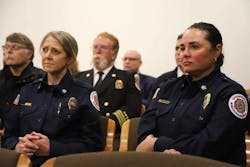OR Legislators Respond with $218M for Historic Wildfire Season Costs
By Sami Edge
Source oregonlive.com (TNS)
Oregon lawmakers on Thursday approved more than $218 million to cover eye-popping bills that the state’s fire fighting agencies incurred during record-breaking blazes this summer and fall.
They approved the funding during a special session which lasted just over three hours Thursday afternoon.
Lawmakers stressed that the money is a stopgap cobbled together so the state can pay contractors who helped fight fires this year. Finding long-term solutions to pay for increasingly severe and expensive wildfire seasons will be among the priorities that the Legislature tackles during the 2025 session.
Oregon’s Department of Forestry will receive about $82 million to pay firefighters and support staff who helped put out more than 1.9 million acres that burned across the state. The Department of the State Fire Marshal, which helps protect communities in the path of wildfires, will get $8.4 million to cover its outstanding bills. Most of the remaining money will go to cover bills that the two agencies eventually expect the federal government to reimburse but that need to be paid now.
The bill passed the Senate with just two no votes from Sen. Brian Boquist, R- Dallas, and Sen. Dennis Linthicum, R- Beatty. It sailed through the House too with only Reps. James Hieb, R- Canby, and Paul Holvey, D- Eugene, voting no.
“We talk about this as a historic wildfire season, I think that we run the risk of this being our new normal,” Rep. Dacia Grayber, a Portland Democrat and firefighter, told the House before its vote. She urged lawmakers to support the bill while keeping in mind their responsibility to ensure the state is prepared for similarly intense fire seasons moving forward.
About $108 million will come from the state’s emergency fund, with the remaining $110 million coming from leftover general fund money, which state forecasters expect to be above $2.8 billion.
Oregon’s fire agencies routinely draw on their operational budgets to front wildfire bills while they wait for repayment from the federal government. It’s a system that lawmakers and agencies have said is unsustainable.
A legislative workgroup is currently considering nearly two dozen longer-term funding ideas, like drawing from lottery funds or increasing lodging or timber taxes. The group is expected to refine its proposals in January before bringing recommendations to legislators.
“It’s a real embarrassment that the state has got itself in this position where we haven’t paid our vendors,” Sen. Fred Girod of Lyons, who lost his home to a wildfire in 2020, told The Oregonian/OregonLive. “We saw all this coming. The model that we used for decades wasn’t working, and we knew it wasn’t working. It’s about time that we did something.”
The state fire marshal’s office has so far been able to stay on top of its bills by fronting wildfire payments from the pool of money that pays for personnel costs and fire safety and education programs, Oregon Fire Marshal Mariana Ruiz-Temple said. The Department of Forestry has also borrowed from agency funds to pay its wildfire bills but hasn’t been able to keep up by doing so. By the end of November, more than $102 million in invoices awaited payment, according to an analysis by the Legislative Fiscal Office. Most of those were at least 45 days old.
During a committee hearing Thursday, Sen. Lynn Findley, R- Vale, criticized the Department of Forestry for failing to communicate how far underwater it would be after the record fire costs. He said he wasn’t aware of the department’s dire financial situation until last month. He called on State Forester Cal Mukumoto to resign.
“This is a complete failure and a lack of confidence in that organization to keep this body informed of what’s going on. This behavior is unacceptable,” Findley said. “Having said that, I support this measure. We’ve got to pay the bills.”
Joy Krawczyk, a forestry department spokesperson, said there has been “clear recognition” by the department, governor’s office and the Legislature that Oregon’s current wildfire funding response “hasn’t kept up with the growing complexity and cost of fire seasons over the past decade.”
“This wildfire season has been especially expensive due to the length and magnitude of the season, with multiple weeks of high fire activity,” Krawczyk said.
Uniformed fire chiefs from around the state accompanied Ruiz-Temple, the state fire marshal, to the Capitol Thursday and watched as lawmakers considered the funding bill.
David Jensen, chief of Mid-Columbia Fire & Rescue in The Dalles, said his department didn’t send firefighters out of their jurisdiction to fight fires around the state this year, so he isn’t wrestling with state reimbursement. But it’s important to his department that third-party fire crews contracted by his agency and the forestry department want to come back each year to help protect his jurisdiction.
“Reputation is a big thing in the fire service,” he said. “Paying in a timely manner, paying what you say you’re going to pay is a big deal … that complement of private contractors being available to fight our fires is important. That system should not, cannot erode.”
©2024 Advance Local Media LLC. Visit oregonlive.com. Distributed by Tribune Content Agency, LLC.






